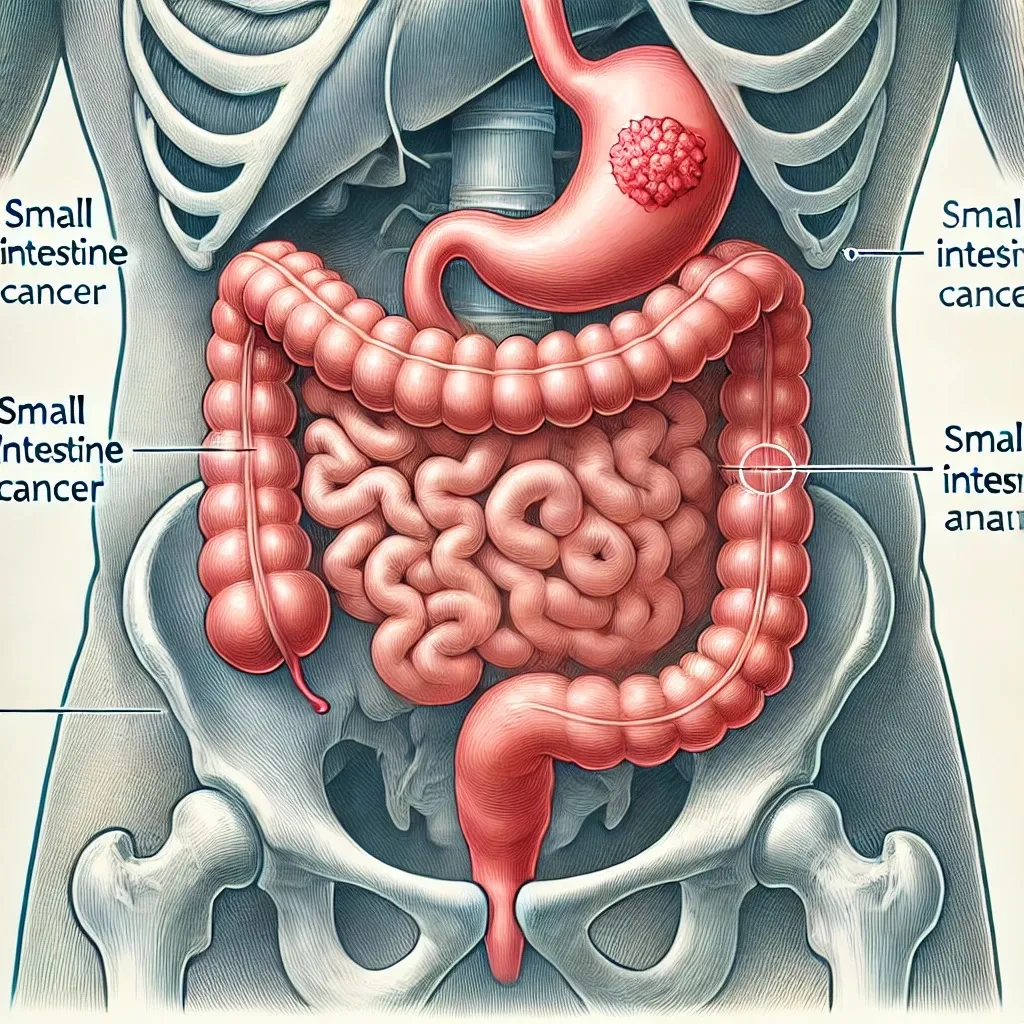Small intestine cancer, also known as small bowel cancer, is a rare type of cancer that occurs in the small intestine, which is part of the digestive system located between the stomach and the large intestine. This type of cancer can affect the absorption of nutrients and the overall digestive process.
Types of Small Intestine Cancer
Small intestine cancer is classified based on the type of cells it originates from:
- Adenocarcinoma: The most common type, starting in the glandular cells lining the small intestine.
- Carcinoid Tumors: Begin in the hormone-producing cells of the small intestine.
- Lymphoma: Originates in the lymphatic cells of the small intestine.
- Gastrointestinal Stromal Tumors (GISTs): Develop from the interstitial cells of Cajal in the walls of the small intestine.
- Sarcoma: Originates in the connective tissues of the small intestine.
Symptoms
Symptoms of small intestine cancer can vary but often include:
- Abdominal pain or cramps
- Unexplained weight loss
- Nausea and vomiting
- Blood in the stool or dark, tarry stools
- Changes in bowel habits, such as diarrhea or constipation
- Fatigue and weakness
Risk Factors
Several factors increase the risk of developing small intestine cancer:
- Age: Most common in people over 60.
- Gender: More common in men than women.
- Family History: Having a family history of small intestine cancer or other gastrointestinal cancers.
- Genetic Conditions: Conditions such as Lynch syndrome, familial adenomatous polyposis (FAP), and Peutz-Jeghers syndrome.
- Crohn’s Disease: Chronic inflammation of the small intestine increases the risk.
- Celiac Disease: Long-term damage to the small intestine from gluten exposure.
- Diet: High-fat diet and consumption of red or processed meats.
Diagnosis
Diagnosing small intestine cancer involves several steps:
- Medical History and Physical Exam: Initial assessment to understand symptoms and risk factors.
- Blood Tests: To check for anemia and other abnormalities.
- Imaging Tests: CT scans, MRI, and barium X-rays help visualize the small intestine and detect tumors.
- Endoscopy: Using a flexible tube with a camera to examine the inside of the small intestine.
- Biopsy: A sample of tissue is taken during endoscopy to confirm the presence of cancer cells and determine the type.
Stages
Small intestine cancer is staged based on how far it has spread:
- Stage I: Cancer is confined to the inner layers of the small intestine.
- Stage II: Cancer has spread to the muscle layers or nearby tissues.
- Stage III: Cancer has spread to nearby lymph nodes.
- Stage IV: Cancer has spread to distant organs or tissues.
Treatment Options
Treatment for small intestine cancer depends on the type, stage, and overall health of the patient:
- Surgery: The primary treatment involves removing the tumor and some surrounding healthy tissue. Types of surgery include resection and segmental resection.
- Radiation Therapy: Using high-energy rays to destroy cancer cells, often used in combination with other treatments.
- Chemotherapy: Drugs used to kill cancer cells, typically used for advanced stages or in combination with surgery.
- Targeted Therapy: Drugs that specifically target genetic mutations in cancer cells.
- Immunotherapy: Boosting the immune system to recognize and attack cancer cells.
Prognosis
The prognosis for small intestine cancer depends on factors such as the type of cancer, stage at diagnosis, and the patient’s overall health. Early detection and treatment significantly improve outcomes.
Living with Small Intestine Cancer
Living with small intestine cancer involves regular follow-ups, managing symptoms, and support from healthcare professionals, family, and support groups. Advances in medical research continue to improve diagnostic and treatment methods, offering hope for better management and outcomes.
Small intestine cancer, though rare, can be effectively managed and treated with early detection and proper care. Understanding its types, symptoms, and treatment options is crucial for effective management and improved quality of life for those affected.
